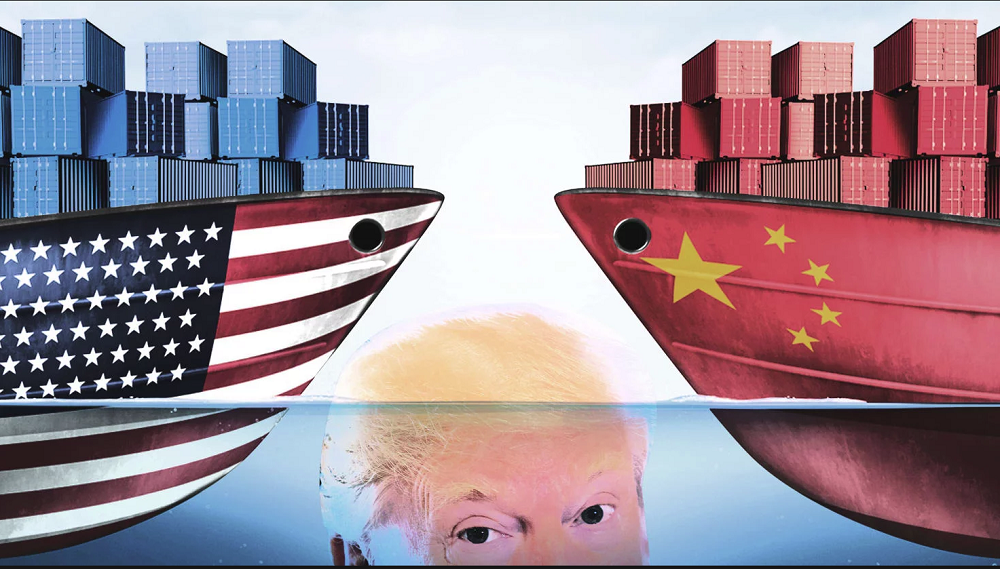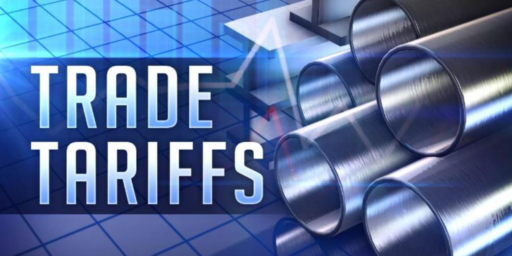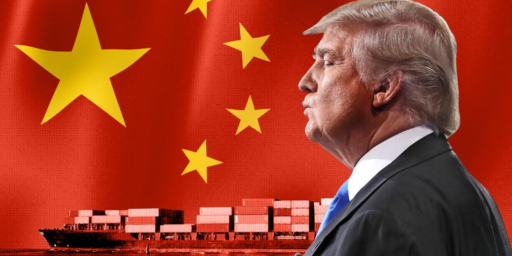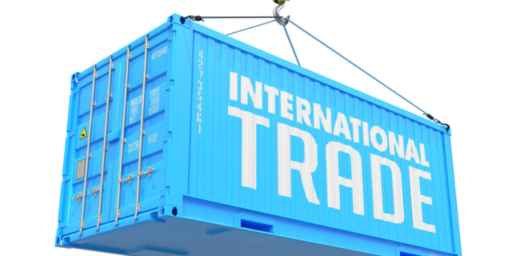Trump Delays Tariffs On Chinese Consumer Goods
President Trump is delaying implementation of his recently announced tariffs on Chinese goods.

Just under two weeks he announced new tariffs against China, including tariffs that would hit a wide variety of consumer goods just as retailers and consumers begin ramping up for the holiday shopping season, President Trump has backed down and delayed some tariffs until December when they’d be far less likely to impact consumers before the holidays:
WASHINGTON — President Trump on Tuesday unexpectedly put off new tariffs on many Chinese goods, including cellphones, laptop computers and toys, until after the start of the Christmas shopping season, acknowledging the effect that his protracted trade war with Beijing could have on Americans.
Mr. Trump pushed a 10 percent tariff on some imports to Dec. 15, and excluded others from it entirely, while facing mounting pressure from businesses and consumer groups over the harm they say the trade conflict is doing.
The stock market soared after the announcement, following weeks of volatility driven by fears that the standoff between the world’s two largest economies could hamper global economic growth.
The decision was the latest twist in a dispute during which China and the United States have alternately escalated tensions with tit-for-tat tariffs and softened their positions as they sought a deal.
Mr. Trump continued to insist on Tuesday that the trade war was hurting only China. But he also admitted that there was potential for the new tariffs to inflict economic pain closer to home.
“Just in case they might have an impact on people,” the president told reporters, “what we’ve done is we’ve delayed it so that they won’t be relevant for the Christmas shopping season.”
Mr. Trump, frustrated that negotiations had failed to yield an agreement, said on Aug. 1 that the United States would impose the 10 percent tariff on $300 billion worth of Chinese imports on Sept. 1. That would be in addition to a 25 percent tariff already imposed on $250 billion of Chinese goods.
But on Tuesday, the United States trade representative’s office said that while a substantial amount of Chinese imports would be subject to the Sept. 1 levy as planned, various consumer electronics, shoes and other items would be spared until mid-December.
The office also said it was dropping 25 types of products from the tariff list altogether “based on health, safety, national security and other factors.” The items include car seats, shipping containers, cranes, certain fish, and Bibles and other religious literature, a spokesman said.
(…)
The tariff announcement followed what Mr. Trump described as a “very productive” call involving Liu He, China’s vice premier and its lead trade negotiator; Robert Lighthizer, the United States trade representative; and Steven Mnuchin, the Treasury secretary.
The three agreed to speak again in two weeks, China’s state-run Xinhua News Agency reported. Negotiators had planned to meet again early next month in Washington.
Now, about $112 billion of Chinese goods will be hit with the 10 percent levy on Sept. 1, according to Chad Bown, a senior fellow at the Peterson Institute for International Economics. Another $160 billion in goods will be subject to the tariff as of Dec 15, he estimated.
Whether the president’s move on Tuesday will ease tensions enough to make a deal with Beijing more likely was unclear
In addition to what essentially amounts to a cave by the President, albeit a temporary one, the President also seemed to acknowledge at least some concern about the political impact of the trade war:
As his re-election campaign gears up, Mr. Trump is increasingly focused on ending the conflict in order to maintain his support among farmers, who have lost some of their main export opportunities as China ordered state-owned companies to stop buying American soybeans. But he has also expressed an unwillingness to accept a deal with China that falls short of his goals.
The president has tried to persuade China to buy large amounts of American farm goods before an agreement is reached, but that hasn’t happened. He continued to berate China on Tuesday for not making such purchases and suggested that the tariffs might force it to do so.
“As usual, China said they were going to be buying ‘big’ from our great American Farmers,” he wrote on Twitter. “So far they have not done what they said. Maybe this will be different!”
The most significant thing about this move on Trump’s part is that it reveals everything he has been saying about tariffs in general and the tariffs that he has imposed so far to be a complete lie. Up until now, the President has claimed, falsely, that the tariffs are being paid by China and that the United States is benefiting from them due to the increased revenue that the Treasury Department is collecting. In reality, of course, tariffs are paid at the time of entry into the United States and they are paid by the importers, suppliers, manufacturers, and retailers that are importing the products into the United States. Ultimately, these increased costs will be paid for either by consumers in the form of increased prices or by workers in the form of lower wages or slower hiring in the face of increased costs. As a result, in the end, tariffs are bad for the economy of the nation imposing them. This is an economic truth that is accepted by economists on both sides of the political spectrum notwithstanding the wishes of the President that it is not so.
As Aaron Blake and Heather Long both note in The Washington Post, this move by the Trump Administration is essentially an admission that the President’s claims about tariffs are false:
Trump himself told reporters the delay is to ensure consumers don’t face higher costs this Christmas. Here are his full remarks:
“We are doing this for the Christmas season, just in case some of the tariffs would have an impact on U.S. consumers. So far they’ve had virtually none. The only impact has been that we’ve collected almost $60 billion from China, compliments of China. But just in case they might have an impact on people, what we’ve done is we’ve delayed it so they won’t be relevant for the Christmas shopping season,” Trump told reporters before he flew to western Pennsylvania.
[President Trump] used qualifying phrases such as “just in case” and “might have,” but his words — and actions — are a noticeable change from his insistence that the Chinese are paying the full cost of his tariffs. (Note that the harm to American farmers comes from China’s counter-tariffs, which Trump has sought to offset with a bailout targeting farm country.)
“The decision to delay new tariffs on Chinese-made toys, smartphones, laptops and other popular holiday gifts is a tacit admission that consumers pay for tariffs, not Chinese producers,” said Ryan Young, a senior fellow at the Competitive Enterprise Institute.
An American family of four would pay about $350 more a year if the full cost of Trump’s latest tariffs was passed to consumers, according to the Tax Foundation. While inflation — a measure of rising costs — has remained low in the United States, the latest data out Tuesday showed some pickup, mainly from increases in gas and rent. A Goldman Sachs analysis also found items that have had tariffs placed on them are seeing costs rise.
“Trump didn’t want to be the Grinch that stole Christmas,” said Phil Levy, a former economist in the George W. Bush administration who is now chief economist at Flexport, a freight and logistics company. “This seems to me like the administration is retreating.”
It clearly is a retreat, and even the explanation given by the White House for why this delay is happening reveals that to be the case. In speaking with reporters after the announcement and on his way to an event in Pennsylvania, Trump said that the delay is being implemented “[j]ust in case they might have an impact on people …. what we’ve done is we’ve delayed it so that they won’t be relevant for the Christmas shopping season.” If the President truly believed that the tariffs are being paid by China and not American retailers and consumers then there’s no reason to be worried about the impact that this might have on consumers and retailers just as the biggest shopping months of the year are set to begin.
One possibility, of course, is that this is all a massive bluff on Trump’s part, something we’ve seen from him before. Earlier this year, for example, the President announced new and exceedingly harsh tariffs on Mexico related to that nation’s alleged failure to comply with promises it had made regarding Central American immigrants. Soon afterward, though, the President called those tariffs off, claiming that he had reached an agreement with Mexico on the issue, although it soon became apparent that this deal was less than meets the eye. We seem to be following the same pattern here.
One suggestion made late yesterday is that the President is making this move in the hope that it will help to jumpstart trade talks. As more than one analyst has pointed out, it’s clear that Trump would like to see a trade deal prior to the 2020 election so he has something successful in the trade area to run on. So far, though, it doesn’t look like that’s going to happen, and many have suggested that China may be waiting out the Trump Administration to see what happens in 2020 and whether Trump is replaced by a Democrat who would end up being more reasonable on trade than the current President.
Whatever the case may be, the next time you hear the President claim, falsely, that tariffs don’t hurt the American economy, remember this announcement. Because he has basically admitted that he’s lying.





He did this because a slow economy at Christmas would hurt his chances in the next election. I don’t think tariffs are a great too, but if you are going to use them you need to be willing to ride out the consequences. Trump claimed the trade war would be easy but his opponent doesn’t have to worry about an election.
Steve
I’m willing to bet everything I own and all I can borrow, that El Cheeto will repeat the “China pays for the tariffs” lie shortly. And a side bet that it won’t faze his base even a little.
@Kathy:
I predict no takers. Why does anyone pay any attention to what this fool says? It’ll be different tomorrow and something else next week.
@gVOR08:
I don’t pay attention to him.
As to his bases, I can hear them “thinking”: He’s said billions of time China pays the tariffs. He may have implied once that this is not the case. So billions to one, China pays the tariffs.
BTW, any time I bet more than I own, it’s a sucker bet. The problem is finding a sucker to take the bait 😉
He’s also probably hearing that the farmers who are having to shoulder the burden of a falling soybean/pork/whatever market aren’t supporting him that much any more.
Trump is trying to back down while claiming victory. All the comments made by Brexiters about the French? Much more applicable in application to Trump.
I’m not an expert on this…but wouldn’t goods from China destined for the US Christmas market already be in the pipeline, and thus removing tariffs wouldn’t have on impact on those prices?
It’s mid-August…are you telling me retailers don’t plan at least 4 months out?
In any case I’d love for one of our feckless 4th Estate to ask him about this.
@Daryl and his brother Darryl: Plans and orders, yes. Deliveries, no. Just in Time logistics. I’ve seen statements Christmas deliveries run out to mid December.
When the cultists find out Trump is “negotiating” with the Democrats about gun laws, tariffs aren’t going to matter to them a damn.
We were never going to win this stupid trade war. American consumers have more power than Chinese workers. And Xi has more to lose by backing down and losing face, especially given Hong Kong. And frankly given that #Cult45 will believe absolutely anything, the big orange jackass can simply declare victory even if it’s a complete surrender.
BTW, has anyone else noticed the Silence of the Trolls?
If it’s about bashing POC, trans folk or ammosexuality, up pop @Guarneri and @Paul and @95. If it’s about the economy – something Guarneri at least imagines himself to be an expert on – it’s tumbleweeds.
@michael reynolds: Cuing up a guarneri hit and run post in 3… 2…. 1…
@OzarkHillbilly:
Maybe he’ll explain why, despite a trillion dollar tax cut for the rich, Trump’s Dow after 3 years is up by pretty much exactly what Obama’s did in his last three years. Obama got his on a tax increase and dropping deficits. Trump’s market is built on stock buy-backs and skyrocketing government borrowing.
All this instability is Trump’s fault, directly, unavoidably. His ‘policy’, his obsessions, his utter ignorance.
@michael reynolds:
ammosexuality?
Step 1: Tip off your big-money donors about imposing tariffs; they short stocks dependent on Chinese imports.
Step 2: Tip them off before you change your mind; they go long on stocks dependent on Chinese imports.
Step 3: Listen to the applause from the rubes in your base.
Step 4: Repeat steps 1-3
I just want to reiterate what I’ve stated before; China is a bad actor and something needs to be done. There is no question about that. The TPP, which Trump walked away from, was an attempt at bringing China under control.
But this administrations actions are misguided and will be ineffective. And caving, with no concessions whatsoever from China, is only going to be counter-productive.
@michael reynolds:
He’s nowhere near that imaginative.
@michael reynolds:
Ignorance is a powerful force. How many people know what happened last year, never mind last decade, in arcane stuff like the price of stocks or the levels of interest rates? But it’s easy to remember Obama never claimed to have the best economy ever, or the biggest growth int he stock market, while Dennison does.
Ignorance wins the day.
Innumeracy is even more powerful.
@Joe:
Not my line, I’m afraid. I think I saw it on Twitter but it might have been here. I’d attribute if I remembered.
@Joe:
That’s the very natural, normal, Christian attraction between a man and his gun(s) and ammunition.
Does anyone think that the trash in the White House will take the right steps to avoid a recession? No? Me neither…
@michael reynolds: American consumers have more power than American workers too along with a huge lack of self awareness.